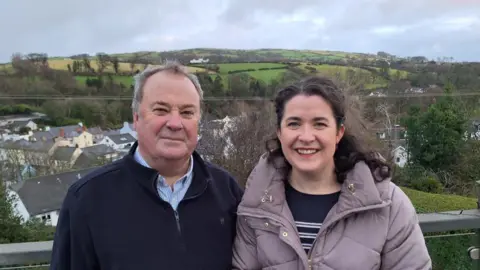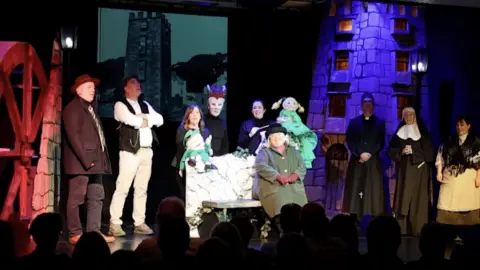The centenary of electricity that sparked a village play
 Maeve McAlister
Maeve McAlisterA rural village in the Glens of Antrim that first generated its own electricity 100 years ago has sparked the idea for a play.
Cushendall is believed to have been one of the first villages on the island of Ireland to have street lights.
Despite many modern inventions, villagers say community spirit there is still strong.
Maeve McAlister said the same spirit from 100 years ago is "very much alive and well now".
Street lights
'Keep er lit' tells the story of how local man Anthony O'Connor used a corn mill to turn on street lights in 1924.
Both Maeve and her father, Andrew McAlister, were involved in the performance by the Lurig Drama Group in November.
"Trying to mark an occasion like that could be quite boring but this was a real way to draw out the human aspect which was quite revolutionary to a village like Cushendall," Maeve said.
Men's shed
 Lurig Drama Group
Lurig Drama GroupMaeve said they got as many people involved as possible "given that the community was so impacted by electricity arriving".
The pieces were written by locals, the men's shed helped build the set and the local pub was used to film a scene.
"It incorporated all the best bits of the village."
Maeve said productions like these were "hugely important to the community".
"We're half an hour away from Ballymena, an hour away from Belfast, 45 minutes away from Coleraine so to go to your nearest theatre is a bit of a trek.
"Yes it's 'am dram'…but having groups like that in communities like ours are vitally important to the quality of life that we have here.
"We might not have a big shopping centre or things but there is so much to enjoy living here.
"This is one little bit to bring the community together."
'A revolutionary thing'
Maeve's father Andrew said it was "quite remarkable" that people living at the foot of Lurig Mountain had electricity before larger towns like Bangor.
"It was a revolutionary thing and I suppose made Cushendall the envy of many a settlement," said Andrew.
"Initially it was simply street lights but very shortly after people's houses started to get attached.
"A village this time of year was a fairly bleak place with no lights, so it was a good thing."
